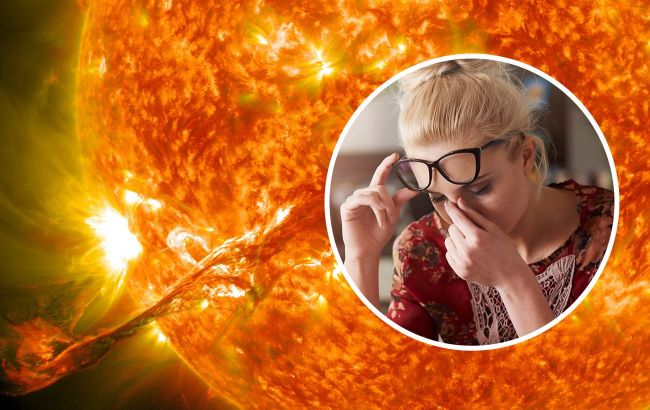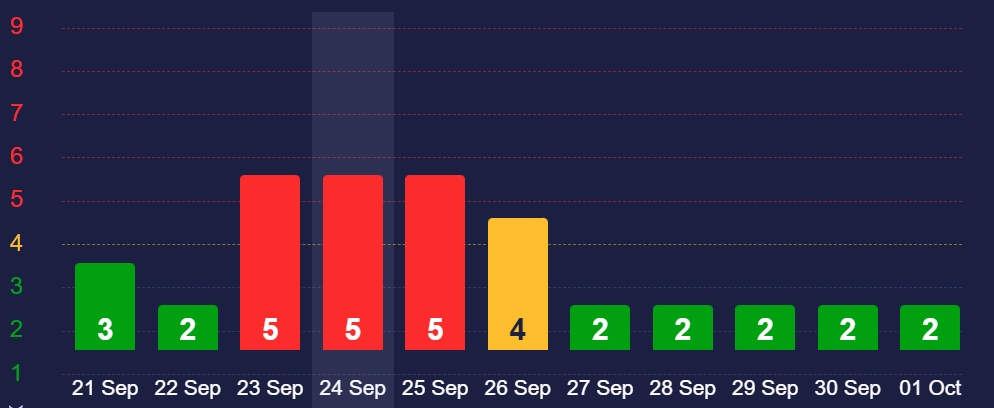Strong geomagnetic storm hits Earth, expected to last several days
 A red-level magnetic storm hit the Earth (Collage RBC-Ukraine)
A red-level magnetic storm hit the Earth (Collage RBC-Ukraine)
A powerful geomagnetic storm has enveloped Earth, and experts predict that it could continue for several days. This type of geomagnetic disturbance can cause health issues for many people around the globe.
Here’s what we know about the storm and how to protect yourself, according to Meteoagent.
What is geomagnetic storm
The Sun frequently experiences flares and explosions that release large amounts of solar energy into space. This energy, made up of charged particles like protons and electrons, travels quickly and reaches Earth's magnetosphere.
When these particles interact with Earth’s magnetic field, they trigger activity known as a geomagnetic or solar storm.
Geomagnetic storms are categorized by K-index levels. Storms from K-index 1 to 4 are moderate and usually have minimal impact on human activity. However, storms ranging from K-index 5 to 9, classified as red-level storms, can cause health problems, exacerbate illnesses, and interfere with satellites and communication systems.
Details about current storm
According to satellite systems like NOAA and TESIS, and international meteorological labs, a red-level geomagnetic storm with a K-index of 5 began impacting Earth on the evening of Monday, September 23.
On Tuesday, September 24, the storm intensified, and experts have forecast that it will continue through Wednesday, September 25.
By Thursday, September 26, the storm will weaken slightly, with the geomagnetic activity dropping to a K-index of 4. Relief is expected by Friday, but forecasts remain subject to change based on solar activity.

Magnetic storms on September 23-26 (screenshot)
How geomagnetic storms affect health
Global research has confirmed the connection between geomagnetic storms and human health. During geomagnetic disturbances, people tend to report more health complaints and seek medical help more frequently.
Scientists point out that magnetic fields can influence bioelectrical processes in the body, leading to sleep disorders, reduced work capacity, and increased irritability.
Common complaints include:
- Headaches, migraines, dizziness
- Difficulty focusing and concentrating
- Decreased productivity
- General weakness and fatigue
- Daytime drowsiness and nighttime insomnia
- Depression
- Irritability and aggression
- Heightened anxiety
- Irregular heartbeat
- Blood pressure fluctuations
- Apathy
- Nausea
- Joint and muscle pain
How to protect yourself during geomagnetic storm
Doctors recommend reducing stress and activity during geomagnetic storms, ensuring proper rest. Additional tips include:
- Getting 7-9 hours of sleep each night
- Eating balanced meals, especially fresh vegetables and fruits
- Not skipping meals
- Drinking enough water
- Limiting caffeine, energy drinks, alcohol, smoking, and unhealthy foods
- Breathing fresh air by spending time in parks, forests, or even your backyard
- Ventilating indoor spaces
- Taking a contrast shower in the morning and a relaxing bath in the evening
- Reducing intense exercise in favor of lighter activities
- Avoiding stressful situations, conflicts, and provocations
- Taking more breaks and resting frequently
- Reducing mental, emotional, and physical strain
- Taking prescribed medications as needed
- Consulting a doctor if health issues worsen
Check out also Morning headaches - 5 reasons they occur and When headache is dangerous: Symptoms requiring medical attention.
This material is for informational purposes only and should not be used for medical diagnosis or self-treatment. Our goal is to provide readers with accurate information about symptoms, causes, and methods of detecting diseases. RBС-Ukraine is not responsible for any diagnoses that readers may make based on materials from the resource. We do not recommend self-treatment and advise consulting a doctor in case of any health concerns.

